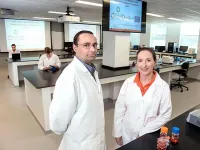(Press-News.org) A new drug reduced tumor size in patients who have lung cancer patients with a specific, disease-causing change in the gene KRAS, a study found.
The results of the CODEBREAK 100 phase 2 clinical trial were presented June 4, 2021, at the American Society of Clinical Oncology (ASCO) annual meeting and published simultaneously in the New England Journal of Medicine. The efficacy and safety of the drug sotorasib, developed by Amgen Inc., was tested in patients with non-small-cell lung cancer (NSCLC) harboring a specific change, or mutation, in the DNA code for KRAS.
The KRAS mutant protein targeted in the study was p.G12C, in which a glycine building block has been mistakenly replaced a cysteine at position 12 in the protein's structure. This change is present in about 13 percent of the more than 200,000 patients diagnosed with lung cancer each year in the United States. KRAS encodes a protein switch that regulates growth but becomes "stuck in the "on" mode" when mutated, signaling cells to continually multiply in tumors.
Sponsored by Amgen - and led by researchers from Perlmutter Cancer Center at NYU Langone Health, Washington University School of Medicine, MD Anderson Cancer Center, and Memorial Sloan Kettering - the global trial included 126 patients that received daily, oral sotorasib. This KRASG12C inhibitor was recently approved by the U.S. Food and Drug Administration for the treatment of adult patients with KRAS G12C-mutated NSCLC.
The researchers found that 37.1 percent of patients in the study saw their tumors shrink by at least 30 percent, termed an "objective response." About 82 percent of those treated experienced some slowing of tumor growth or "disease control."
All patients in the study had been treated previously with either immunotherapy (PD1-inhibitors) or platinum-based combination chemotherapy, but those treatments were no longer effective for them, and their cancers had begun to regrow. With no targeted options, such patients typically do poorly, with response rates to standard treatments between 6 and 20 percent, according to previous studies.
"The excitement surrounding this trial result is that sotorasib, just approved for clinical use, becomes the first targeted therapy for lung cancer patients with KRAS mutations," says co-corresponding study author Vamsidhar Velcheti, MD, associate professor of Medicine at NYU Grossman of Medicine, and director of thoracic medical oncology at Perlmutter Cancer Center. "KRAS-targeted treatments, decades in the making, are urgently needed for these patients with limited therapeutic options."
The average duration of responses to sotorasib in the current trial was 11.1 months, with a median period during which disease did not worsen (progression-free survival) of 6.8 months, say the study authors. With currently available treatments, median progression-free survival for these patients is between two and four months.
"Sotorasib showed clinically significant benefit without any new safety concerns in patients with this specific form of KRAS mutant lung cancer," says co-corresponding author Ramaswamy Govindan MD, the Anheuser Busch Chair in Medicine at Washington University School of Medicine. "Moving forward, our team will seek to inform the development of combination therapies featuring sotorasib and other emerging drugs, and to determine which best fit the mix of mutations in each patient's cancer cells."
First of Its Kind
The RAS gene family is among the most frequently mutated in human cancers, with one member of the group, KRAS, the most commonly occurring mutant in solid tumors. KRAS has considered "undruggable" for decades because its active form does not include a suitable pocket to which drugs can attach.
Sotorasib is a novel covalent inhibitor that, thanks to recent advances in medical chemistry, can target a specific building block (cysteine residue) only present in the inactive form of KRAS. When the mutated KRAS switch toggles into its inactive state, sotorasib can attach to a structural feature called the switch II pocket and react with the mutant cysteine at position 12, freezing KRAS in the inactive state.
The phase 2 trial CodeBreak 100 study also focused on safety, finding that, while nearly 70 percent of patients had treatment-related adverse events, only about 20 percent had more severe events that required reduction of the dose of sotorasib. About 7 percent of patients had to stop treatment because of severe side effects. The most frequent of these were diarrhea, nausea, fatigue, and an increase in liver enzyme levels. There were no life-threatening side effects, and no treatment-related deaths in the study.
All patients in the single-arm CodeBreak 100 trial were treated with sotorasib, and none with placebo, as is standard in early studies of this type. The ongoing phase 3 CodeBreak 200 trial (NCT04303780), which is comparing the effect of sotorasib against a chemotherapy, docetaxel, will seek to confirm the current results in 345 patients with NSCLC harboring the KRAS p.G12C mutation.
INFORMATION:
Along with Velcheti and Govindan, the study authors included first authors Ferdinandos Skoulidis of the University of Texas MD Anderson Cancer Center in Houston, and Bob Li of Memorial Sloan Kettering Cancer Center and Weill Cornell Medicine in New York. Other study authors were Grace Dy of Roswell Park Cancer Institute in Buffalo; Timothy Price of Queen Elizabeth Hospital and University of Adelaide, Australia; Gerald Falchook of Sarah Cannon Research Institute at HealthONE, Denver; Jürgen Wolf of the Center for Integrated Oncology at the University Hospital Cologne in Germany; Antoine Italiano of the Early Phase Trials and Sarcoma Units, Bergonie Cancer Institute, Bordeaux, France; Martin Schuler of West German Cancer Center at the University Duisburg-Essen, Germany; Hossein Borghaei of Fox Chase Cancer Center in Philadelphia; Fabrice Barlesi and Benjamin Besse of M. Gustave Roussy Institute in Villejuif, France; Terufumi Kato of Kanagawa Cancer Center, Yokohama, Japan; Alessandra Curioni-Fontecedro of University Hospital Zurich, Switzerland; Adrian Sacher of Princess Margaret Cancer Centre, Toronto, Ontario, Canada; Alexander Spira of Virginia Cancer Specialists, Fairfax, VA; Suresh Ramalingam of Winship Cancer Institute of Emory University; and Toshiaki Takahashi of the Division of Thoracic Oncology, Shizuoka Cancer Center, Japan. Study authors from Amgen Inc. of Thousand Oaks, California, were Abraham Anderson, Agnes Ang, Qui Tran, Omar Mather, Haby Henary, Gataree Ngarmchamnanrith, and Gregory Friberg.
The study was funded by Amgen Inc. and is listed at ClinicalTrials.gov (NCT03600883). Dr. Velcheti is a paid consultant of Amgen, with the relationship managed according to the policies of New York University.
Washington, DC--A team led by Carnegie's Thomas Shiell and Timothy Strobel developed a new method for synthesizing a novel crystalline form of silicon with a hexagonal structure that could potentially be used to create next-generation electronic and energy devices with enhanced properties that exceed those of the "normal" cubic form of silicon used today.
Their work is published in Physical Review Letters.
Silicon plays an outsized role in human life. It is the second most abundant element in the Earth's crust. When mixed with other elements, it is essential for many construction and infrastructure projects. And in pure elemental form, it ...
A study of more than 1,000 demographically representative participants found that about 22 percent of Americans self-identify as anti-vaxxers, and tend to embrace the label as a form of social identity.
According to the study by researchers including Texas A&M University School of Public Health assistant professor Timothy Callaghan, 8 percent of this group "always" self-identify this way, with 14 percent "sometimes" identifying as part of the anti-vaccine movement. The results were published in the journal Politics, Groups, and Identities.
"We found these results both surprising and concerning," Callaghan said. "The fact that 22 percent of Americans at least sometimes identify as anti-vaxxers was much higher than expected and demonstrates ...
Most Americans should get screened for colorectal cancer beginning at age 45 instead of age 50, according to new recommendations from the U.S. Preventive Services Task Force, which includes UVA Health's Li Li, MD, PhD, MPH. This recommendation applies to Americans without symptoms who do not have a history of colorectal polyps or a personal or family health history of genetic disorders that increase the risk of colorectal cancer.
Colorectal cancer is the third-leading cause of cancer death in America, according to the Task Force, and an increasing number of cases are being diagnosed in younger Americans. The Task Force notes that colorectal cancer diagnoses among Americans ages 40 to 49 increased by almost 15% from 2000-02 to 2014-16. Black ...
While previous research early in the pandemic suggested that vitamin D cuts the risk of contracting COVID-19, a new study from McGill University finds there is no genetic evidence that the vitamin works as a protective measure against the coronavirus.
"Vitamin D supplementation as a public health measure to improve outcomes is not supported by this study. Most importantly, our results suggest that investment in other therapeutic or preventative avenues should be prioritized for COVID-19 randomized clinical trials," say the authors.
To assess the relationship between vitamin D levels and COVID-19 ...
Tuberculosis (TB) is a deadly infection that occurs in every part of the world. The standard treatment for TB, a six-month multidrug regimen, has not changed in more than 40 years. Patients can find it difficult to complete the lengthy regimen, making it more likely that treatment resistance will develop.
A research team led by a Medical University of South Carolina (MUSC) investigator reports in the May 6 issue of the New England Journal of Medicine that a four-month treatment regimen using rifapentine is effective for treating TB. Shortening the treatment duration is an important step toward increased patient adherence.
In 2019 alone, 1.4 ...
As meat-eating continues to increase around the world, food scientists are focusing on ways to create healthier, better-tasting and more sustainable plant-based protein products that mimic meat, fish, milk, cheese and eggs.
It's no simple task, says renowned food scientist David Julian McClements, University of Massachusetts Amherst Distinguished Professor and lead author of a paper in the new Nature journal, Science of Food, that explores the topic.
"With Beyond Meat and Impossible Foods and other products coming on the market, there's a huge interest in plant-based foods for ...
Physicists in Israel have created a quantum interferometer on an atom chip. This device can be used to explore the fundamentals of quantum theory by studying the interference pattern between two beams of atoms. University of Groningen physicist, Anupam Mazumdar, describes how the device could be adapted to use mesoscopic particles instead of atoms. This modification would allow for expanded applications. A description of the device, and theoretical considerations concerning its application by Mazumdar, were published on 28 May in the journal Science Advances.
The device which scientists from the Ben-Gurion University of the Negev created is a so-called Stern Gerlach Interferometer, which was first proposed one hundred years ago by German physicists Otto Stern and Walter ...
Researchers in Lund, Copenhagen and Norwich have shown that harmful mutations present in the DNA play an important - yet neglected - role in the conservation and translocation programs of threatened species.
"Many species are threatened by extinction, both locally and globally. For example, we have lost about ten vertebrate species in Sweden in the last century. However, all these species occur elsewhere in Europe, which means that they could be reintroduced into Sweden. Our computer simulations show how we could theoretically maximize the success of such reestablishments", says Bengt Hansson, biologist at Lund University.
In a new study published in Science, the researchers investigated which individuals might be most suited for translocation ...
The COVID-19 pandemic forced instructors to adapt their courses for online learning. Laboratory courses were particularly difficult due to lack of access to specialized equipment for remote learners. To overcome this challenge, researchers from the University of Illinois Urbana-Champaign designed a laboratory exercise to teach students how to use micropipettes, through remote learning, using at-home kits.
Micropipettes are common--and essential--laboratory instruments and are used in several fields including molecular biology, microbiology, and biochemistry. They are used to accurately transfer very small volumes of liquid. To teach students how to use these instruments, the researchers developed kits, costing $135 per student, that were a fraction ...
COLUMBUS, Ohio - New research suggests that African American families living in public housing are a "hidden population" when it comes to national suicide prevention efforts.
The study showed 11% of Black teens and young adults living in a mid-Atlantic public housing development reported that in the previous 12 months, they had made a plan to die by suicide.
The finding fits with what previous research has shown: that African American youths are the fastest-growing group engaging in suicidal behavior and dying by suicide, and have the highest suicide death rate increase among any other racial or ethnic minority group, ...




